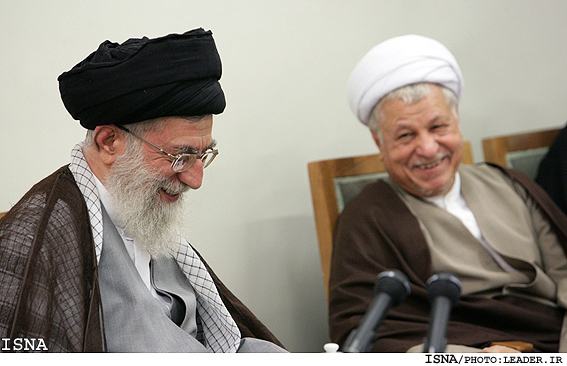The Iran opposition website, Rahesabz, has reported that the dispute between Ahmadinejad and Iran’s Parliament has ended. Apparently, Ayatollah Hashemi Rafsanjani met with Ayatollah Khamenei (the Islamic Republic’s Supreme Leader), where an agreement was made between the two that Khamenei would asked the Supreme Council of Cultural Revolution (SCCR) to stop the dispute in exchange for Rafsanjani’s praise of the Supreme Leader in public.
This is interesting because it reveals a number of things.
First, Khamenei’s narcissistic personality is very much at play in the dynamic of the power struggle that has surfaced and intensified since the rigged Presidential election of June 2009. He is clearly feeling vulnerable in the public relations department. This is not surprising considering the many street protests against his rule (chants “Death to the dictator” and even “Death to Khamenei”, once unheard of in the Islamic Republic are now very common place during the protests). He clearly also sees this as an opportunity to humble Rafsanjani for not clearly siding with him in Iran’s power struggle.
Second, the deal adds more insight to the revelations made by Muhammad Sahimi in his piece in Tehran Bureau, Who’s In Charge?, in which Sahimi highlights the internal rift in the Islamic Republic between the militant revolutionary guards and the conservative clerics (mullahs). Khamenei appears to be precariously balanced with one foot on the head of the guards and another on the head of the clerics. But it has always been my opinion, based on his background and his actions over the 31 year history of the Islamic Republic that Khamenei is a man of the guards. He is with them. And whether he likes it or not now, his post is tied to them–even more so since he has used them to crush the opposition protests. Khamenei’s offer to Rafsanjani shows that, at the very least, he believes he has influence on the matter of the dispute over the university–either that, or he thinks Rafsanjani might believe that he does.
Third, Rafsanjani probably realizes that if Khamenei calls off the dispute, then in a way Khamenei’s hand has been forced. On the one hand, if the Ahmadinejad and the guards back off, then Azad University is ‘safe’ for now. On the other hand, if they don’t back off, it reveals (again) the rift between Khamenei and Ahmadinejad. Either outcome is better than the status quo for Rafsanjani. He also may be calculating that some form of public praise for Khamenei will be seen by most observers as the political move that it is, and be largely disregarded by his supporters and the opposition.
Khamenei likely would not have made the deal if he did not at least have some misgivings about the beast that he has created in Ahmadinejad and the revolutionary guards. He is playing all sides against each other in a desparate bid to maintain his own position, influence and power. It is difficult to imagine that he is getting much rest these days.


Pingback: Iran Analyses: A Rafsanjani-Khamenei Deal on Universities Crisis? (Siavashi and Verde) | Enduring America()